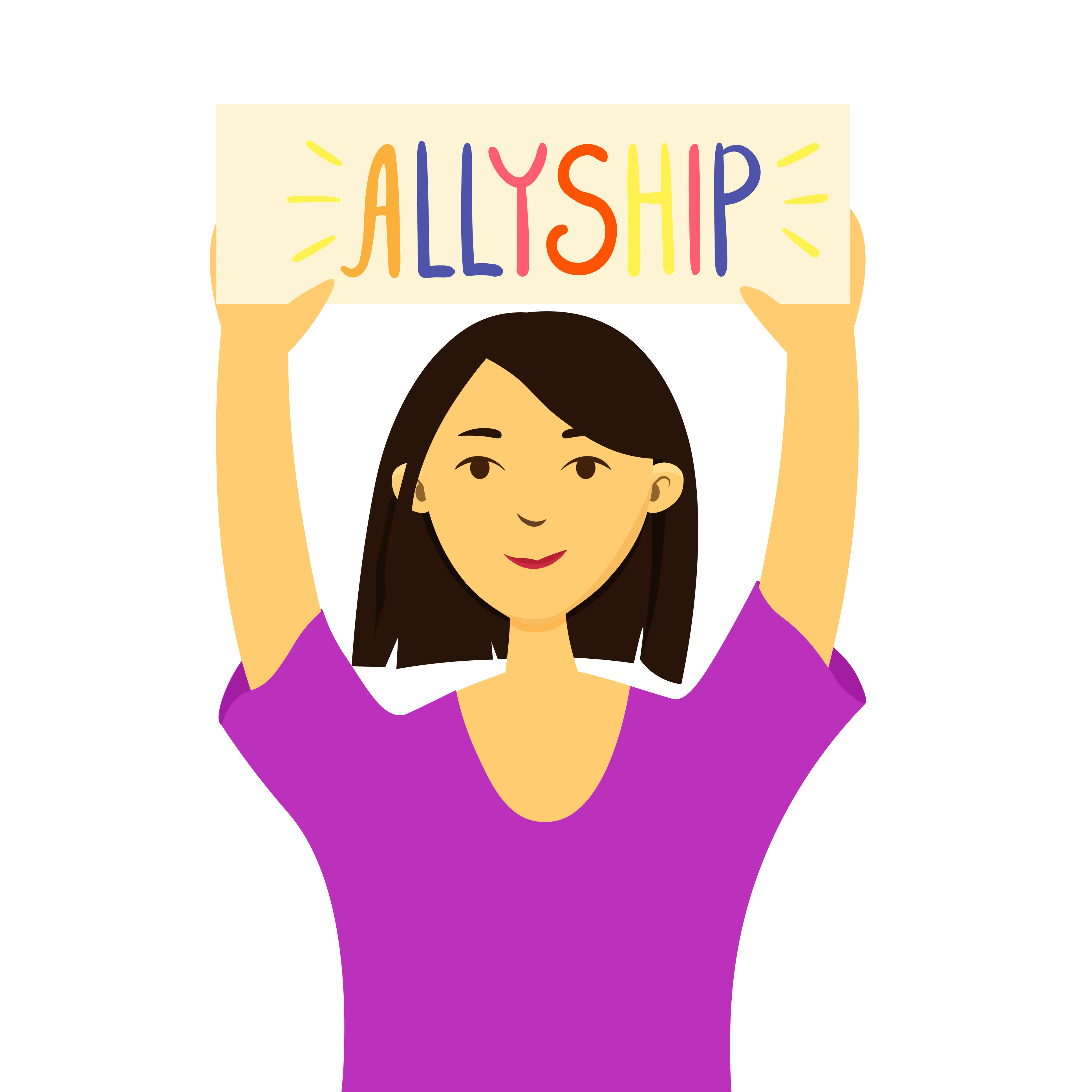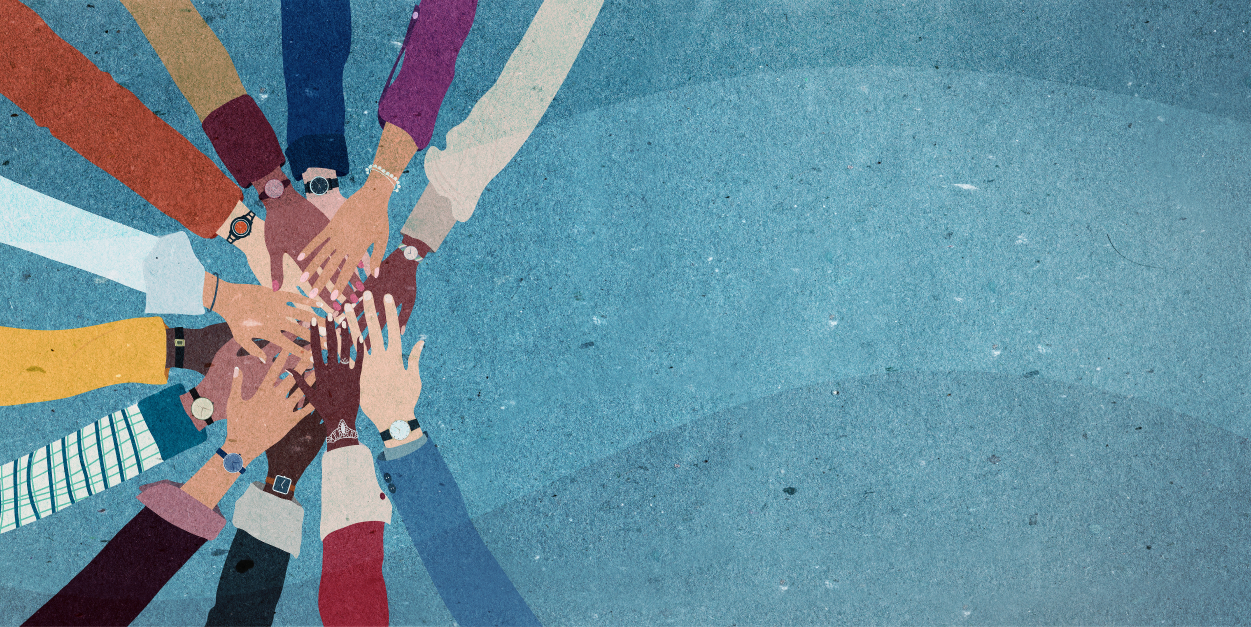Allyship Guide
This section will explain what allyship is, along with examples of how you can be an ally for other people. Allyship is important to ensure inappropriate behaviours are challenged and that marginalised groups are supported against discrimination.
Let’s talk about allyship
What is allyship?
Allyship is an active and consistent effort to use your privilege to support and advocate for people with less privilege, by understanding the struggles that they face. (We discuss what privilege means in more depth in the next section.) An ally is someone who is not a member of the particular marginalised group who they are supporting. You may be part of a particular marginalised group yourself, but you could also be an ally for another group. Allies recognise the privileges that they have and want to support and take action to help that group. Actions are particularly important for long term, sustained change. An important part of taking actions to be an ally is that your actions are not reactive, one-off periods of support, which is called performance allyship. Actions need to be consistent and maintained.
Being an ally is about helping and supporting a group or community but is never about receiving thanks. You should stay focussed on the people you are supporting and the impact you want to have, rather than how you wish to feel. Being an ally is not about you or your feelings – it is about recognising your privilege and advantages, educating yourself and supporting others.
One of the key principles of allyship is not to ask people from marginalised backgrounds to take on the burden of having to educate people from non-marginalised backgrounds in what it means to be a good ally. The burden of increasing knowledge, understanding and skills must fall on the person looking to become an effective ally.
This guide contains some steps and resources you can use to be an ally.
What are the types of allyship?
There are two types of allyship: effective allyship and performative allyship. Effective allies are those that take action and initiative to lead the change they want to see – they don’t just talk about wanting to make change. Performative allies are allies only in name. Their “support” of a marginalised group is often only when it is convenient for them and can be harmful to a group.
Can you think of a time where you might have been an ally? What did you do? What would you do differently?
Why is allyship important?
By better understanding the struggle and oppression that others face, you are learning and actively attempting to make a change, to try and prevent this from happening. By supporting people in the workplace through allyship, you can work towards creating a safer space.
Allyship is important because it helps to dismantle the systems that are disadvantaging marginalised groups. This is especially true when those in advantaged or privileged positions recognise how their role can and should be more active in accelerating that change.
Let's talk about privilege
What is privilege?
Privilege is the unearned advantage an individual receives from being a part of a dominant group whose needs have traditionally been prioritised. You may experience privilege because of your gender, race or another characteristic. You can experience a combination of privilege and disadvantage. For example, a white woman can experience privilege because of their race, but be at a disadvantage because of their gender.
You may have heard of the term ‘white privilege’, which refers to your skin colour either giving you an advantage or be a barrier. White privilege accumulates through the advantages and benefits you may have if you identify as White. It does not mean that because you are White you have never suffered from any disadvantages - it means that your race didn’t add to your disadvantages. You may not even be aware of the disadvantages that individuals face as a result of their race.
How to be an ally
There are lots of ways that you can be an ally and show your support for a marginalised group. There are various online resources which can help direct you – including BBC Radio 4’s piece ‘How to be a good ally’. Here is our summary of some of the ways you can start and continue to be an ally.
Educating, learning, and training
Educate yourself on the struggles that marginalised groups can face. It’s important to understand the challenges others face which could be related to a protected characteristic, such as their race, gender, sexual orientation or disability. This can help you think about what actions you can take in your daily life to combat these challenges.
Within this toolkit there is a section within each of the protected characteristics that lists various resources to engage with to learn more and explore. The toolkit can point you towards helpful resources you can read, listen to or watch. Find what works for you – some people might prefer to read an article or a book while others might prefer to engage with a video or podcast. Find out what training is available to equip yourself with the skills to help you be an ally.
Challenge behaviours and language
You can be an ‘active bystander’ when witnessing inappropriate behaviour. If you hear someone mispronounce someone’s name, let them know and confirm the correct pronunciation. If you hear someone say something offensive, let them know that this is not acceptable. Being an active bystander means being aware when someone’s behaviour is inappropriate or threatening and choosing to challenge it, or by assisting someone who needs support.
Too often, people are afraid of getting it wrong so do or say nothing, which can be far worse. Leaders and managers worry about saying the wrong thing but just saying something and normalising the conversation is hugely powerful. It is important that leaders challenge inappropriate or discriminatory behaviours as this role models to others a behaviour that should be followed. You can find out more about being a role model and inclusive leadership on our Modelling Inclusive Behaviours page.
Ask questions if you’re unsure
If you’re unsure about the language you are using when referring to a particular characteristic, you can ask questions but always do so in a respectful way. You could ask a trusted friend or colleague if you’re unsure. Remember to be empathetic and considerate when asking questions. The Leading with Empathy and Allyship podcast series covers building empathy for each other.

Allyship initiatives
There are different ways in which you can be an ally to different marginalised groups in the research environment. We’ve listed some specific examples below.
Race Equality
The #mynameis campaign was set up to normalise adding a phonetic spelling of your name to places such as your email signature. This is to help address the negative impacts of misnaming which can include individuals feeling undervalued, underappreciated and lead to low confidence in their place of work or research. It is an international campaign that we can all get involved with.
You can check out the Wonkhe article that looks at the impact of misnaming people and a blog post discussing the lasting impact of frequent misnaming. Nottingham Trent University have compiled a list of 10 tips to ensure you can say your students’ (and indeed colleagues’) names correctly.
The section on race as one of the protected characteristics also discusses the challenges that individuals can face because of their race.
LGBTQ+ Community
You can be an ally to the LGBTQ+ community and show your support by wearing a rainbow lanyard and understanding what the colours represent. Wearing a rainbow lanyard shows your support for and solidarity with the LGBTQ+ community. You can explain what the colours represent to others to raise awareness of how to be an ally. You could ask colleagues if these lanyards are available.
You may have seen people with pronouns on name badges, at the bottom of their emails, or in Zoom meetings (e.g. He/Him, Their/Them). Sharing your pronouns indicates to others that you are an aspiring ally who understands the implications of misgendering (assuming and using the wrong pronoun for someone). Making pronouns visible is an important part of allyship. International Pronouns Day takes place on the 3rd Wednesday of October each year which is an opportunity to spread awareness of the importance of sharing pronouns.
There are guides available online which can support you in being an ally to transgender and non-binary communities:
You can find out more about being an ally to the LGBTQ+ community on our sexual orientation and gender reassignment pages.
Gender Equality
The term 'manel' is used to refer to an all-male panel at a meeting or conference. People often use it on social media in response to increasing awareness of the over-representation of men on panels and is used to highlight the exclusion of women as experts. The phrase ‘manel watch’ is used to highlight the importance of calling out all male panels. On Twitter hashtags such as #NoMoreManels or #GenderAvenger can be used to call panels to account.
Learn more and explore
We recognise that not everyone has the same learning styles, so to complement some of the written information and resources listed throughout this section, below there are a range of video recommendations to engage with, as well some further research articles that may interest you. It is important to take the time to do self-directed learning. We’ve put together some further Allyship resources that you can engage with online.
Websites and articles
- Guide to Allyship
- What Makes an Effective Ally?
- 8 Ways To Be a (Better) Ally
- Be a Better Ally
- Tips for Allies of Transgender People
- 10 ways to step up as an ally to non-binary people
Videos
- 3 ways to be a better ally in the workplace
- The Bystander Effect: The Science of Empathy
- Rethinking Privilege
- 5 Tips to be a Good Ally
- Allyship in Practice
Podcast
Book
- Bridge the Culture Gaps: A toolkit for effective collaboration in the diverse, global workplace – Robert Gibson
For Newcastle colleagues and students
Below you will find a list of services and resources available to colleagues and students at Newcastle University. You may find it useful to be aware of these either for yourself or to direct members of your team to.
Further resources to explore
What is Allyship? (ncl login required)
Making Pronouns Visible is an important part of Allyship (ncl login required)
Training and Workshops
The University runs a 3-part training workshop for colleagues on how to ‘Be an Active Bystander’, which you can book within the Learning Management System (ncl login required). This programme covers what it means to be an active bystander, encouraging attendees to reflect on their experiences and feelings, to understand how they can be an active bystander. This can help empower you to take action when witnessing bullying, harassment or other forms of inappropriate behaviour. The University also runs training workshops on White Privilege and Anti-racism and Allyship, where you can learn more about these topics.
